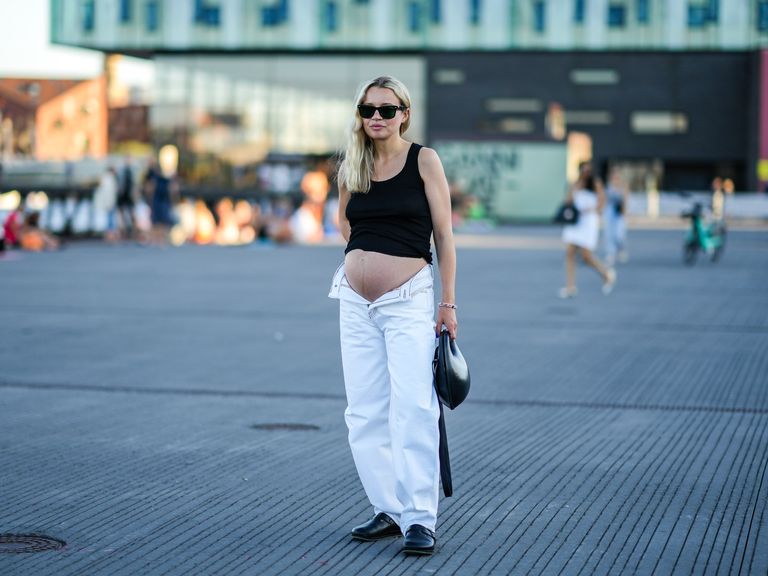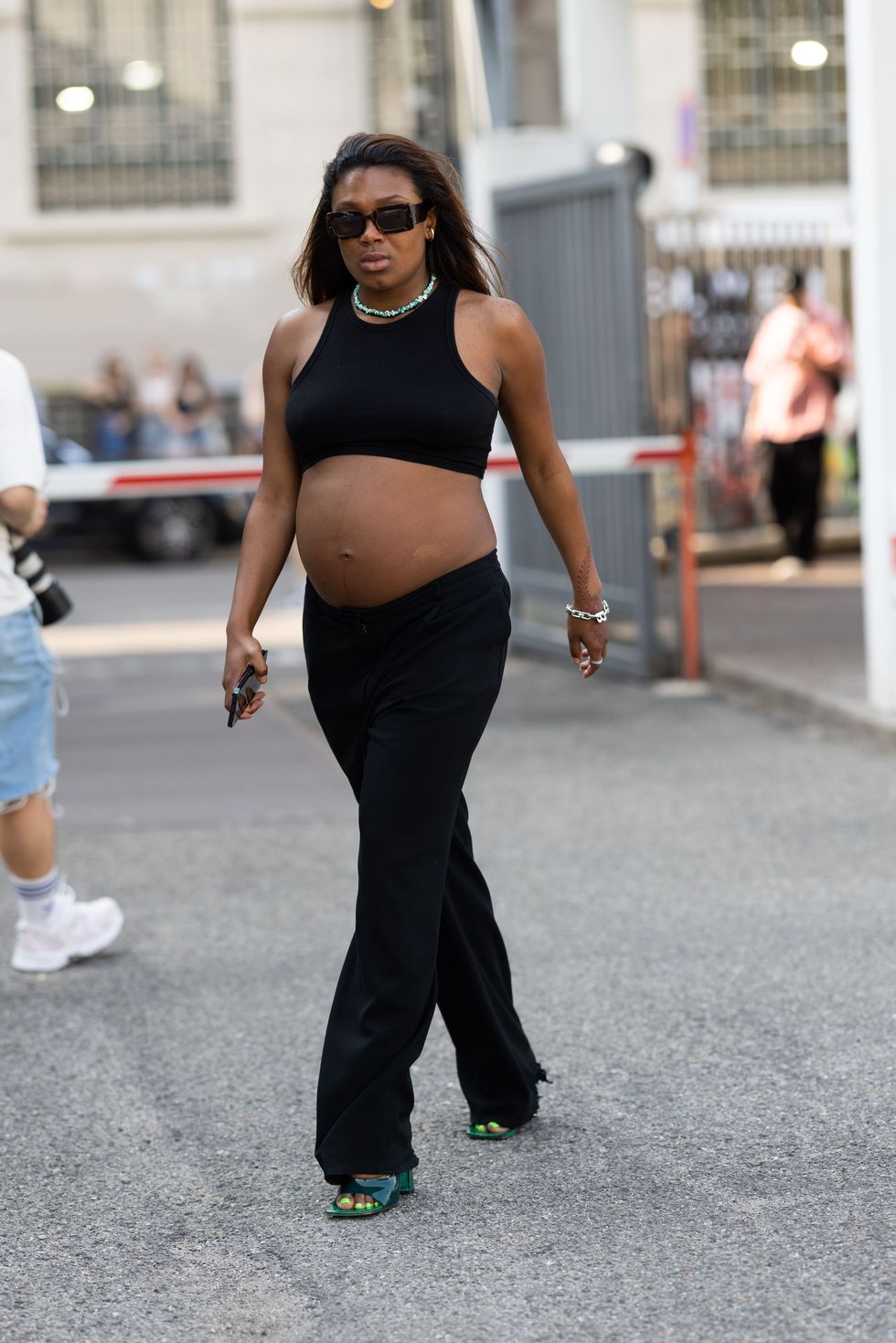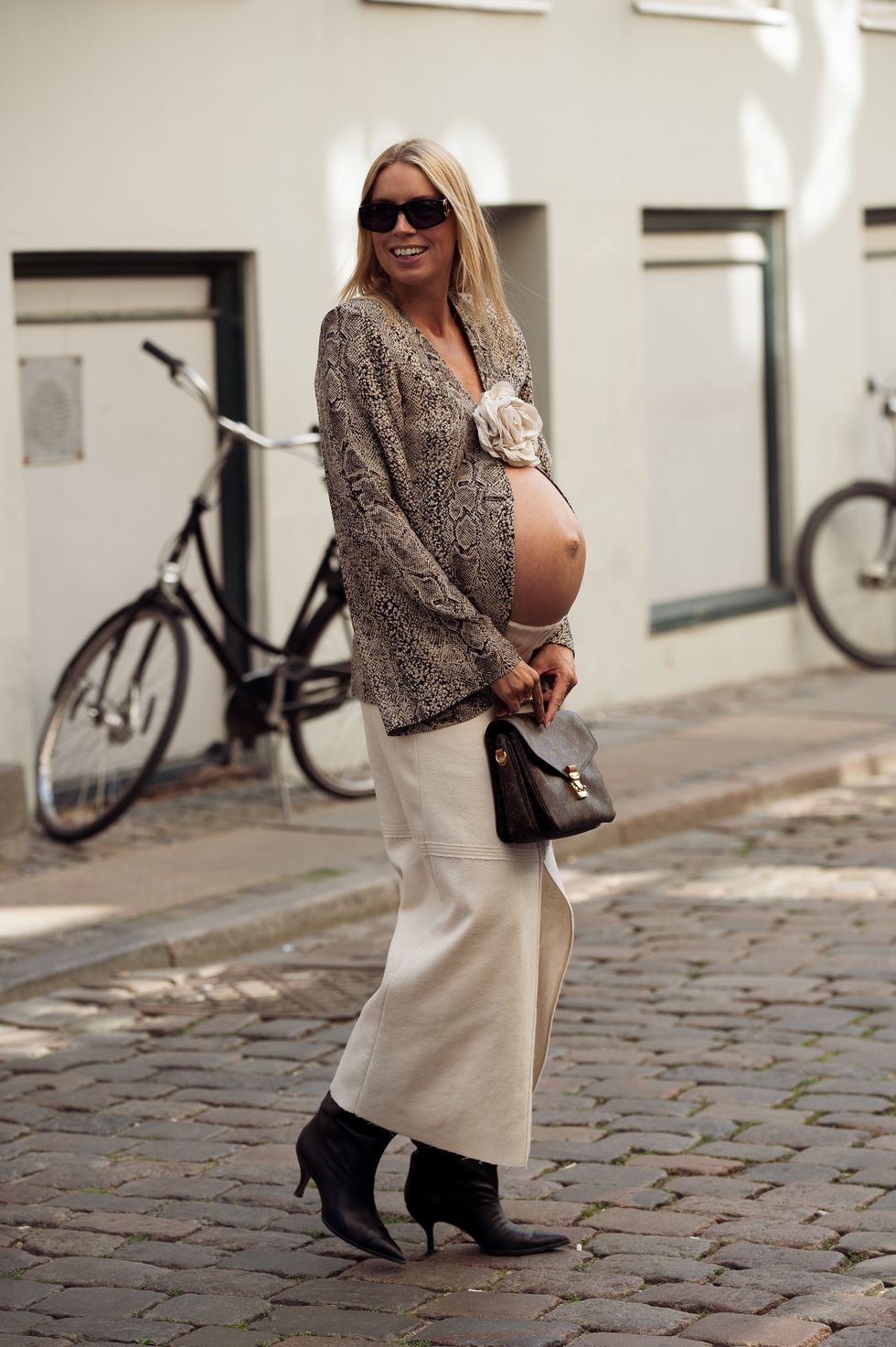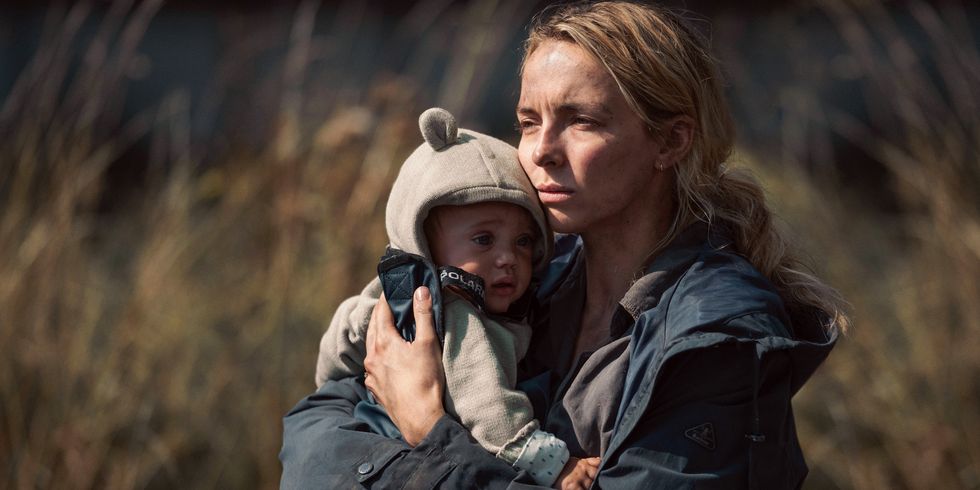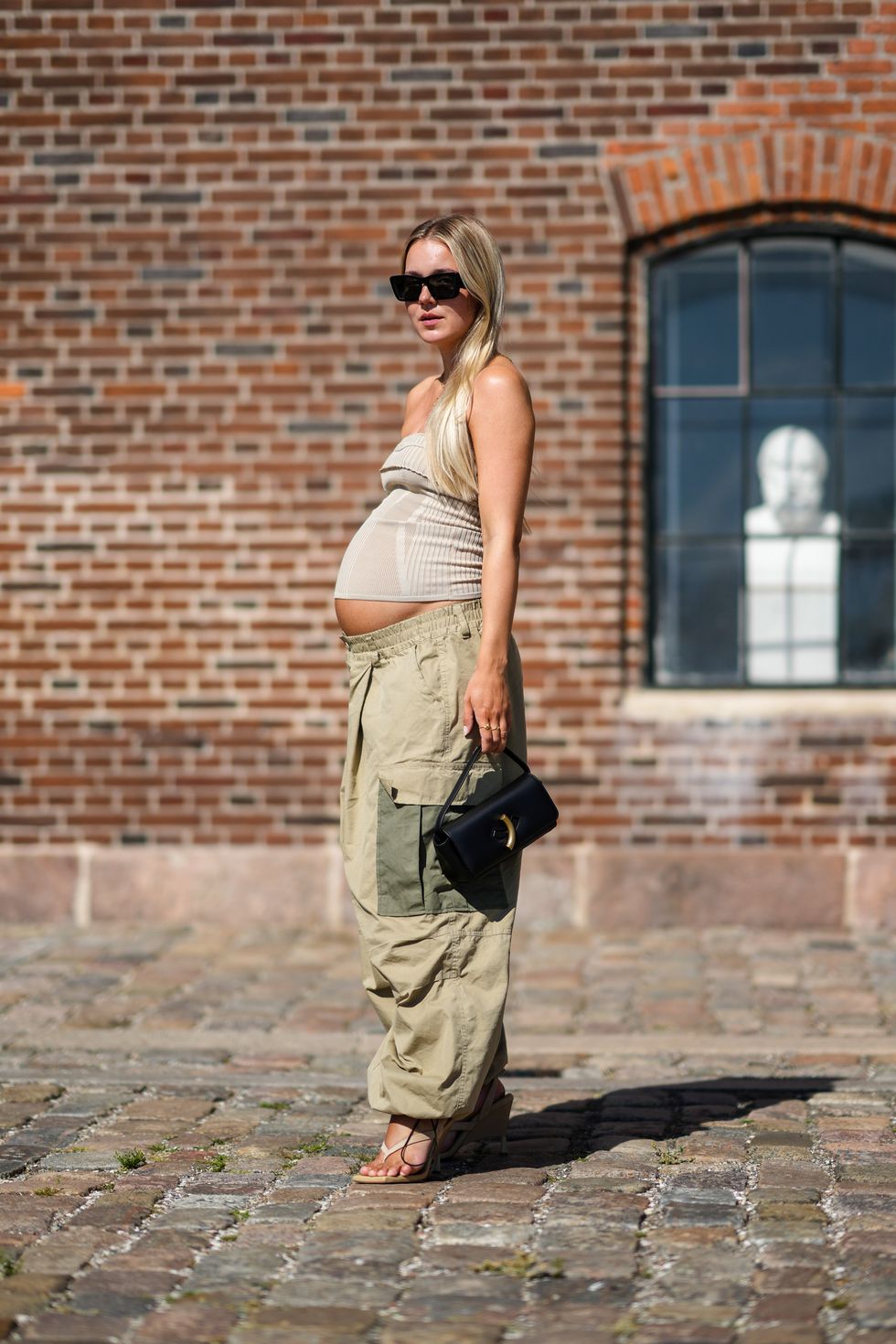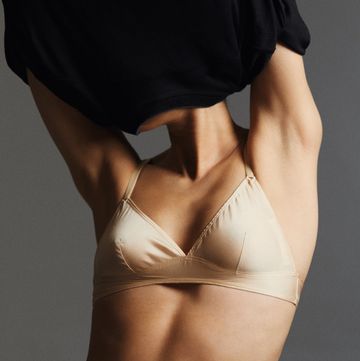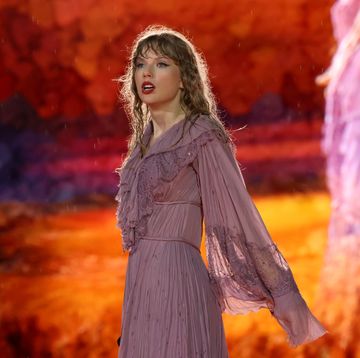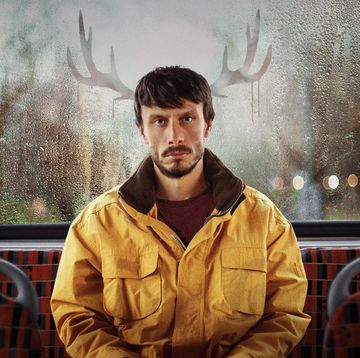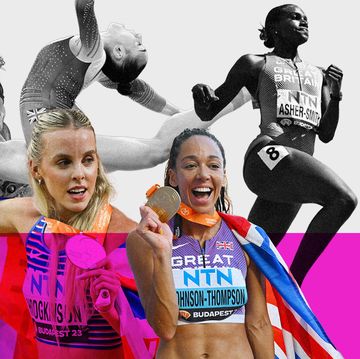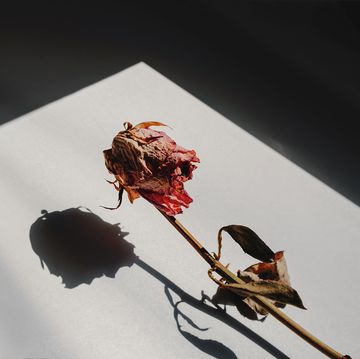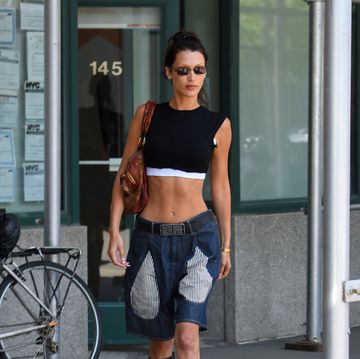At a wedding recently, someone asked me if my pregnancy – I am almost eight months along at the time of writing – had been unplanned. I guess they were reacting to the fact that when they’d said, ‘Are you excited?’ my reply had been a muted, ‘I don’t know if I’d call it “excitement”.’ My boyfriend interjected, ‘No, it wasn’t unplanned, we talked about it,’ which is true, and which made my trepidation about motherhood seem all the more incongruous.
The fact is, those two blue lines crystallised for me a few uncomfortable truths about the precarity of the modern world. Dr Heather McMullen, a social scientist at Queen Mary University who has studied reproductive trends, describes it best: ‘It’s been a heavy few years in terms of Covid, plus the information we’re getting about the climate; there are a lot of global crises and conflicts that are really present in the news right now, and in the UK we’ve had austerity and a cost-of-living crisis to contend with. I think what some people are saying is, “This feels like an unbearably vulnerable choice for me to make under the current circumstances.”’
FIND OUT MORE ON ELLE COLLECTIVE
This will be a year of landmark elections in both the UK and the US (as well as Russia, India, South Africa and many other countries around the world). The baby – my baby – is due at the end of April. By November, Donald Trump could be making his way to the White House again and Labour might have finally wrestled back power in the UK, breaking a 14-year Tory stranglehold. When I found out I was pregnant, I suddenly had this sense that the world my child would be born into would look very different to the one I had grown up in, too different perhaps for me to help her navigate.
The unbearable vulnerability of parenthood is something that Aga Marszalek also confronted in her early thirties. ‘I considered having children,’ she says. ‘More than “considered” – I started buying baby clothes because I thought, “This could be for me”.’ Now 47, and childfree by choice, she sees this as a formative period in her climate activism. Aga has been interested in environmental issues since teenagehood. ‘Even back in the 1990s we learnt in school about the environmental impact that humans were having on the planet and it filled me with a sense of dread,’ she says.
But, she adds, it wasn’t until the prospect of motherhood became more reality than far-off fantasy that she was finally forced to reckon with what that dread was telling her: ‘I thought, what kind of world would this baby inherit? Given everything, how could I create an environment where the baby feels as safe, as cared for, as optimistic as I did when I was growing up?’ The decision, that the world was becoming too inhospitable to bring a child into was, she says, ‘a sad one. There were some moments of real sadness. But I look around now and feel like I made the right choice.’
For years, Aga felt fairly isolated. ‘Many people didn’t get it; I am still the black sheep in my family,’ she says, laughing. But as awareness of the impending climate catastrophe has spread, more and more of us are coming to similar conclusions. In fact, Aga is now part of The BirthStrike Movement. Founded in the UK in 2019, in reaction to a growing sense that, without drastic change, the future holds little hope for humanity, the movement is a loose collective of people, believed to number in the hundreds, who have made the decision not to procreate. Though members always stressed that reproduction was a personal choice, for years BirthStrikers faced outrage. As anthropologist and reproduction researcher Dr Katie Dow points out, ‘BirthStrike has a stark message about existential threat and some people just didn’t (and don’t) want to hear it, especially in the context of children. There’s always been this sense, within climate activism, that we’re doing it for future generations, because the effects of carbon emissions are always represented as somewhat in the future. What BirthStrike has done is to make that very personal, driving home that it really means your children.’
For Aga, joining BirthStrike was about ‘letting other people who have similar concerns know that they are not alone’. Five years after the movement was founded, the tide of public opinion seems to be turning. At the end of 2023, a study by University College London (that took in the views of more than 10,000 people, living mainly in the global north between 2012 and 2022) found that concerns over climate change had become a major driver in reproductive decision-making. The higher the level of climate anxiety, the more likely people were to say they didn’t want children – or that they wanted fewer children. Like Aga, respondents focused on the legacy future children might inherit, as well as the not insignificant environmental impact of having a child. ‘I’m a teacher, so it’s not like I don’t have children in my life,’ says Aga, ‘I love children. But I feel like I can have a much better impact this way, than by adding another person to an already overstretched planet.’
Within culture, the spectre of a dying planet has begun to haunt many narratives around parenthood. Megan Hunter’s dystopian novel The End We Start From was recently adapted for cinema; Jodie Comer stars as the protagonist known only as Mother, a woman who gives birth just as a Biblical flood wipes modern civilisation away. It joins other films, like Netflix hit Leave the World Behind, in using depictions of family and parenthood as a way to make global catastrophe personal. There was one scene in particular that stuck with me – of Mother (aka Comer) running away from armed militia, her newborn strapped to her chest. The vulnerability of her situation – alone, running for her life, holding a baby who is just a few weeks old – left me with a churning sense of dread.
Of course, declining birth rates (in 2022, natality in England and Wales dropped to its lowest level in more than two decades, while studies showed the US birth rate fell by 30% in 15 years) aren’t just down to climate concerns. In January, researchers from the University of Southampton and the international Generations and Gender Programme released findings from a first-of-its-kind UK Generations and Gender Survey, where 7,000 respondents were questioned on everything from their fertility history to their housing situation. The findings showed that ‘childfree by choice’ had become a ‘new normal’ for adults in the UK, with less than half of 25-to-34-year olds saying they definitely intended to reproduce. Climate featured among their reasons for remaining childfree, but respondents also worried about their future career prospects, the cost of childcare (Britain has some of the most expensive early-years care in the world) and the housing crisis.
Dr McMullen calls these ‘overlapping issues’: ‘A sense of instability connects a number of these different drivers; people are reacting to a more unpredictable future and that doesn’t just relate to climate, it relates to precarity more broadly.’ Since the technological revolution destabilised global job markets way back in the early 2000s, whole industries have been brought to the brink of collapse – and the concept of a ‘job for life’ has been rendered completely alien to anyone under the age of 50. ‘These things are all connected,’ says Dr McMullen, ‘and they contribute to an overarching sense that the future is not as stable as we once imagined it to be.
It’s a feeling that 27-year-old Londoner Ben* has had to confront in the past few months. In December, he was served an eviction notice two weeks after finding out his girlfriend of four years was pregnant. ‘It would be our third move in 18 months – all three were due to the fact that our landlords were increasing the rent by anywhere between 18 and 30%.’ A week later, as they contemplated moving back in with his mum, Ben’s girlfriend suffered a miscarriage. ‘We’ve cried a lot over the past two months – because there was no question about it: we would have kept the baby. But in a way, and this feels like a horrible thing to say, we are also relieved. I always thought I’d have children, I love children – but the prospect of finding ourselves couch-surfing again, with a baby on the way, was honestly terrifying. I basically didn’t sleep for 10 days, worrying about how we’d make everything work.’
The experience, he says, has changed how he feels about starting a family. Much like it did for me, he says that the pregnancy crystallised a number of issues for him: ‘The financial situation we’re in, the situation the country is in in terms of housing and the cost of childcare, the fact that it feels like things are getting worse not better – economically and ecologically – on a global scale. Children are meant to be a joy and privilege but the world isn’t what it was a generation ago, and the reality is that you might end up giving your children a worse, harder life than the one you had. I just don’t think I can face doing that.’
Perhaps that is why, alongside falling birth rates, those who do choose to, and are able to, have children, are doing so later in life. New figures published by the Office for National Statistics in February showed that for the first time the average age for women to have their first child has risen to 32, and the majority of women are still childless at 31. To put this in context, this is an increase of 10 years since the 1950s. Modern parenthood – motherhood in particular – does indeed, from the outside looking in, seem incredibly difficult for all but a very lucky few. Online, most of the ‘mum content’ we are served paints a bleak picture of sleeplessness, overwhelm, overwork; of lives and careers derailed, of relationships ruined. I’d be lying if I said that scrolling certain accounts and reading certain newsletters didn’t put me off parenthood – and that I still feel deeply ambivalent about the prospect when I consider how many parents lament the sacrifices they’ve made since having children. Is there a way to do it without becoming a slave to your progeny? By some accounts it seems like there isn’t. Without a doubt, the feeling of being overwhelmed that parents express is borne out of the same difficult situations and sense of precarity that put many off having children altogether (climate, cost of living, cost of childcare, cost of housing, lack of stability in the job market – it all adds up), so it’s not that I’d begrudge someone ‘sharing their truth’, it’s just that it does make for some quite hard reading (and viewing, in the case of TikTok) for those who’ve yet to experience it. When I spoke to my friends who have children, they told me that the pay off for all this hard labour was the very intense brand of love that you felt for your child. Is that it? I wondered. A potent cocktail of hormones that creates a love so strong it drives you half-mad?
The 37-year-old comedian and writer Kiri Pritchard-McLean puts it like this: ‘I look around now at my friends with families, and in particular the cis-het couples who’ve had children, and see that even the best dad is not a mum. There is absolutely no way that there isn’t more of an impact on the mum. And of course, birthing a child enriches your life in many untold ways, but if you’re a mum it also demonstrably makes your life harder. I’m very privileged – I have almost every privilege there is – but I don’t need my life to be any harder.’ (Currently childfree, she has toyed with the idea of motherhood over the years and come to the conclusion that if she has children, it’ll be through other means than giving birth.)
In her finely drawn work of non-fiction Matrescence, writer Lucy Jones explores her own journey into motherhood (she calls these years ‘the loneliest time of my adult life’) describing the radicalising force of the experience – the fact that badly funded maternity provisions, unstable housing and expensive childcare options have a direct role to play in how people experience parenthood. As Dr Dow points out: ‘Many people have an idea of what a family will look like, and it’s a picture modelled on previous generations. But times are very different and having a child is simply more expensive now than it was 30 years ago, people have to work a lot harder and juggle more, while the state offering isn’t as robust. It makes for a very different experience than their parents might have had.’
For Dr Dow, though, there is a huge advantage to the fact that many of us no longer tacitly accept the old dictum that biological reproduction is necessary or ‘what we’re here to do’. ‘Many climate activists I’ve spoken to in the past came to the conclusion that the normative vision of a family – you know, the white picket fence, big detached house, two cars and regular holidays – is very climate-intensive, which didn’t make them want to just give up, but rather prompted them to think of alternative ways to create their families. In a similar way, I think the conversations that we’re having now will lead to a positive shift in our concept of family.’ Rather than fewer families, she sees it leading to a ‘proliferation of the roles’ we play in one another’s lives; as more of us embrace the prospect of forming meaningful bonds with children and young people who we’re not genetically related to, the idea of who and what a family is will, by necessity, expand. ‘All of which has the potential to bring us all closer, rather than push us apart.’
For me, as time has worn on and the baby has begun to shift and wriggle, an alien being in the middle of my body, I have made peace with the vulnerability of this new role. The world is still a scary place even for someone like me, with all my resources and privileges – but I guess, like every person who’s been in this position before me, I am choosing to embrace hope.
*Name has been changed
ELLE Collective is a new community of fashion, beauty and culture lovers. For access to exclusive content, events, inspiring advice from our Editors and industry experts, as well the opportunity to meet designers, thought-leaders and stylists, become a member today HERE.
